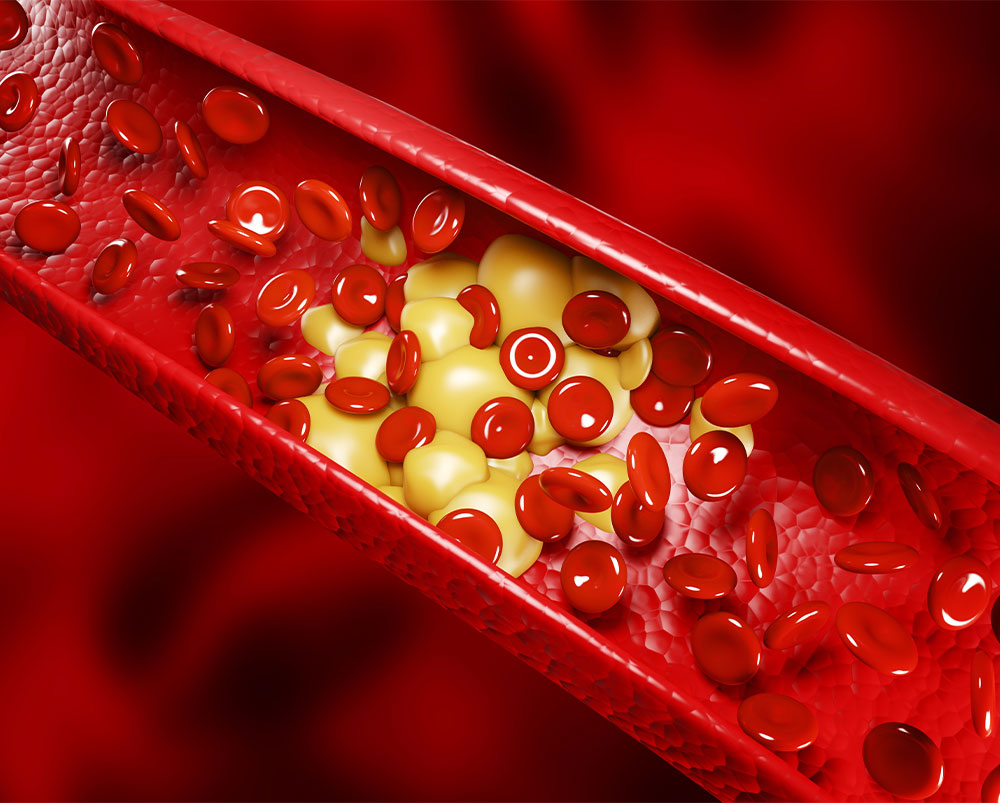Keeping your cholesterol levels in check is crucial for maintaining good health. But what exactly is cholesterol, and how do you know if your levels are normal? In this blog, we'll address all of your concerns about cholesterol. We'll start with the basics, breaking down the role of cholesterol in our body. From there, we'll dive into interpreting blood tests and understanding what "normal" cholesterol levels look like. But it's not just about knowing what's healthy - we'll also explore the risks and symptoms associated with high cholesterol. And if you're wondering how to lower your cholesterol levels, we've got you covered with tips on lifestyle changes and supplements that can help. By the end of this post, you'll have a better understanding of why it's important to keep tabs on your cholesterol and how to do so effectively.
Understanding Cholesterol: The Basics
Cholesterol is a fatty substance present in the blood. It can be categorized into two types: low-density lipoprotein (LDL) (bad) and high-density lipoprotein (HDL) (good) cholesterol. Having high levels of LDL cholesterol, often referred to as 'bad cholesterol', increases the risk of heart disease, while HDL cholesterol helps remove LDL cholesterol from the arteries. HDL carries cholesterol away from the cells and back to the liver, where it's either broken down or passed out of the body as a waste product. For this reason, HDL is referred to as "good cholesterol" and higher levels are better. Maintaining a healthy balance between LDL and HDL cholesterol is crucial.
The Role of Cholesterol in the Body
Cholesterol plays a vital role in the body, serving as the building block for hormones and vitamin D. It also aids in the digestion of fats. The liver produces cholesterol, and it can also be obtained from certain foods. The body has complex mechanisms to regulate cholesterol levels. However, if there is an excess, it can lead to the accumulation of plaque in the arteries.
Interpreting Cholesterol Blood Tests
Cholesterol blood tests provide valuable insights into our cardiovascular health. These tests measure different types of cholesterol present in our bloodstream. Total cholesterol, which includes both LDL and HDL cholesterol levels, is an important factor in assessing our risk of cardiovascular disease. LDL cholesterol, also known as "bad" cholesterol, should be kept low to reduce the risk of heart disease. On the other hand, HDL cholesterol, often referred to as "good" cholesterol," plays a protective role by removing excess LDL cholesterol from the arteries. A lipid profile test is commonly used to obtain a comprehensive view of our cholesterol levels, including LDL, HDL, and triglyceride levels. The National Institute for Health and Care Excellence (NICE), the body that produces guidance and advice for health professionals, has recently produced new guidance on measuring cholesterol. By evaluating these results, healthcare professionals can assess our risk of cardiovascular disease and determine appropriate interventions or cholesterol-lowering medication if necessary. Blood cholesterol levels are measured with a simple blood test.

What Makes for Normal Cholesterol Levels?
Normal cholesterol levels are typically below 200 mg/dL for total cholesterol, below 100 mg/dL for LDL cholesterol, above 60 mg/dL for HDL cholesterol, and below 150 mg/dL for triglycerides.
All About High Cholesterol: Symptoms and Risks
High cholesterol typically shows no symptoms, but it poses a significant risk for cardiovascular diseases. Risk factors include a poor diet, lack of exercise, obesity, family history, certain medical conditions, an inherited condition called familial hypercholesterolaemia (FH), and lifestyle factors. Managing high cholesterol entails adopting a healthy lifestyle and, in some cases, medication. By addressing these lifestyle factors and the inherited condition, individuals can reduce the potential risks associated with high cholesterol.
Can a Low Cholesterol Diet Be Harmful?
Extreme restriction of dietary cholesterol is not necessary for everyone. While a low cholesterol diet can benefit those with high cholesterol, it's important to focus on reducing saturated and trans fats. A balanced diet with nutrient-rich foods is key for overall health. Consulting with a registered dietitian can provide personalized guidance.
Normal cholesterol levels UK with Supplements
Supplements can be beneficial in lowering cholesterol levels. Promising options include NMN, berberine, and glutathione, which have shown potential in managing cholesterol. Quercetin and lion's mane are also being studied for their ability to lower cholesterol.

The Role of NMN, Berberine, and Glutathione
NMN, Berberine, and Glutathione play a vital role in regulating cholesterol levels. NMN helps maintain healthy cholesterol levels, while Berberine lowers LDL cholesterol and increases HDL cholesterol. Glutathione acts as an antioxidant, protecting against LDL cholesterol oxidation. These compounds are beneficial for maintaining good cholesterol levels and reducing the risk of coronary heart disease.
Exploring the Benefits of Quercetin and Lion's Mane
Quercetin, a flavonoid, may help in reducing LDL cholesterol levels. Studies have shown that lion's mane, a mushroom, has potential in lowering cholesterol. These natural compounds offer promising benefits in managing cholesterol levels. Incorporating quercetin and lion's mane into your diet or considering supplements may contribute to maintaining healthy cholesterol levels. Harness the power of nature to support your overall cardiovascular health.
When Should You Get Your Cholesterol Levels Tested?
Regular cholesterol level testing is crucial for those at risk of high cholesterol, including individuals who are overweight. Adults aged 20 and older should undergo screening, while individuals with a family history of high cholesterol or heart disease should get tested earlier. Frequency of testing can be determined by your healthcare provider based on your risk factors, helping assess heart health and guide treatment decisions. Your GP may recommend that you have your blood cholesterol levels tested if you have been diagnosed with coronary heart disease, stroke or mini stroke (TIA), or peripheral arterial disease (PAD), or if you have a family history of early cardiovascular disease or a close family member who has a cholesterol-related condition.
Understanding Your Test Results
Interpreting cholesterol test results is crucial for assessing your heart health. Your test results provide information about the different levels of cholesterol in your blood, such as LDL (bad cholesterol) and HDL (good cholesterol). Understanding your total cholesterol level, including the total cholesterol (TC) number, is also important. Additionally, you might be able to get separate results for your good and bad cholesterol and your total cholesterol to HDL ratio. Paying attention to triglyceride levels can give you a comprehensive view of your overall cholesterol profile.

Lifestyle Changes for Lowering Cholesterol
Incorporating regular exercise, maintaining a healthy diet, managing weight, and quitting smoking are key lifestyle changes for lowering cholesterol levels. Engaging in physical activity helps increase good cholesterol (HDL) and decrease bad cholesterol (LDL). A balanced diet that is low in saturated fat and high in nutrition can also improve your cholesterol profile. These changes can significantly reduce the risk of coronary heart disease and high blood pressure.
Why is it Important to Know Your Cholesterol Levels?
Understanding your blood cholesterol levels is crucial for identifying and addressing potential risk factors for heart disease. By knowing your levels, including your blood cholesterol level, you can take proactive measures to maintain cardiovascular health and make informed decisions about cholesterol-lowering medications. Additionally, monitoring blood cholesterol levels is important for individuals with a family history of heart problems and understanding the links between high blood cholesterol and other medical conditions.
How Can High Cholesterol Impact Your Health?
High cholesterol can have a significant impact on your health. It can lead to the formation of plaque in your arteries, increasing the risk of heart attacks and strokes. Managing cholesterol levels is crucial for maintaining overall cardiovascular health and preventing future complications such as liver disease.
Frequently Asked Questions
Is 5.5 very high cholesterol?
A total cholesterol level of 5.5 mmol/L falls within the borderline-high range. It's important to interpret cholesterol levels in conjunction with other risk factors for heart disease. High cholesterol can be managed through lifestyle changes and, if necessary, medication.

What is a good cholesterol level for my age?
A good cholesterol level for your age is determined by several factors. For adults, the ideal total cholesterol level is below 200 mg/dL. A total cholesterol level of 200-239 mg/dL is considered borderline high. For HDL (good) cholesterol, men should aim for 40-50 mg/dL and women for 50-60 mg/dL. It's important to consult your doctor to determine the best cholesterol target range based on your age and overall health. This table is a general guide for ideal cholesterol and triglyceride levels for healthy adults in the UK. If you have a condition such as heart disease or diabetes, your target levels may be lower – your doctor will be able to tell you your individual targets.
What is a healthy normal cholesterol level in the UK?
A healthy normal cholesterol level in the UK is typically below 5mmol/L. The ideal range for LDL (bad) cholesterol is less than 3mmol/L, while HDL (good) cholesterol levels should be above 1mmol/L for men and above 1.2mmol/L for women. Your doctor may talk to you about your level of ‘non-HDL’ cholesterol. This is now sometimes used as a measurement instead of LDL, and includes your LDL cholesterol and other forms of ‘bad’ cholesterol. Eating a healthy diet, exercising regularly, and quitting smoking can help maintain healthy cholesterol levels.
What cholesterol level means I need medication?
If your cholesterol level is 240 mg/dL or higher, it indicates a high risk for heart disease. A decision about medication is based on all your risk factors, not just cholesterol. A cardiovascular risk assessment predicts your risk of heart attack or stroke in the next 10 years. The computer programme that predicts it is called QRISK, so you may hear your doctor talk about a ‘QRISK score’. Starting medication depends on various factors like age, family history, and lifestyle. Generally, medication may be recommended if LDL levels are above 190 mg/dL or if you have pre-existing cardiovascular disease. Consult your healthcare provider before starting any medication.
What are high cholesterol levels?
High cholesterol levels occur when there is an excess of cholesterol in the blood. According to the American Heart Association, high cholesterol is defined as having a total cholesterol level of 240 mg/dL or higher. Too much cholesterol in your blood can cause fatty material to build up in your artery walls, leading to a higher risk of heart disease and stroke. High levels of LDL (bad) cholesterol and low levels of HDL (good) cholesterol can contribute to this condition, increasing the risk even further.

What are considered normal cholesterol levels in the UK?
Normal cholesterol levels in the UK are typically below 5 mmol/L. Ideally, LDL cholesterol levels should be below 3 mmol/L, while HDL cholesterol levels should be above 1 mmol/L for men and 1.2 mmol/L for women. Triglyceride levels should be below 1.7 mmol/L in the UK.
How often should I get my cholesterol levels checked?
It is generally recommended to get your cholesterol levels checked every four to six years. However, if you have risk factors like a family history of high cholesterol or smoking, you may need more frequent check-ups. Your healthcare provider can help determine the ideal frequency based on your individual situation. Maintaining a healthy lifestyle can also contribute to keeping your cholesterol levels in check.
What factors affect cholesterol levels in the body?
Factors that can affect cholesterol levels in the body include diet, exercise, weight, genetics, smoking, alcohol consumption, certain medications, and medical conditions. Understanding these factors is important for maintaining healthy cholesterol levels.
What are the risks of having high cholesterol levels?
High cholesterol levels pose serious risks, including heart disease and stroke. They can lead to plaque buildup in arteries, reducing blood flow to vital organs. Peripheral artery disease and atherosclerosis are also more likely. Maintaining healthy levels through diet, exercise, and medication helps reduce these risks.
How can I lower my cholesterol levels naturally without medication?
Regular physical activity, such as brisk walking or cycling, can aid in lowering cholesterol levels. A healthy diet rich in whole grains, fruits, vegetables, and lean proteins is also beneficial. Including heart-healthy fats from nuts and seeds can have a positive impact. Quitting smoking and reducing stress through techniques like meditation or yoga may contribute to natural cholesterol reduction.
Can exercise help to lower cholesterol levels? If so, what type of exercise is best?
Regular exercise can help lower cholesterol levels. The best type of exercise for this purpose is aerobic exercise, such as running, cycling, and swimming. Aim for at least 30 minutes of moderate-intensity exercise most days of the week.
What types of medication are commonly prescribed for high cholesterol levels in the UK?
Statins are frequently prescribed in the UK for high cholesterol. Other medications include ezetimibe, bile acid sequestrants, and PCSK9 inhibitors. The choice of medication depends on cholesterol levels and other health conditions. Regular monitoring is essential for effective management of high cholesterol.
References:
https://www.ncbi.nlm.nih.gov/pmc/articles/PMC6070517/
ncbi.nlm.nih.gov/pmc/articles/PMC5821945/
https://www.ncbi.nlm.nih.gov/pmc/articles/PMC5237507/
https://digital.nhs.uk/data-and-information/publications/statistical/health-survey-for-england
https://www.bhf.org.uk/informationsupport/risk-factors/high-cholesterol
https://www.britishcardiovascularsociety.org
https://www.nhs.uk/health-assessment-tools/calculate-your-heart-age





Leave a comment (all fields required)